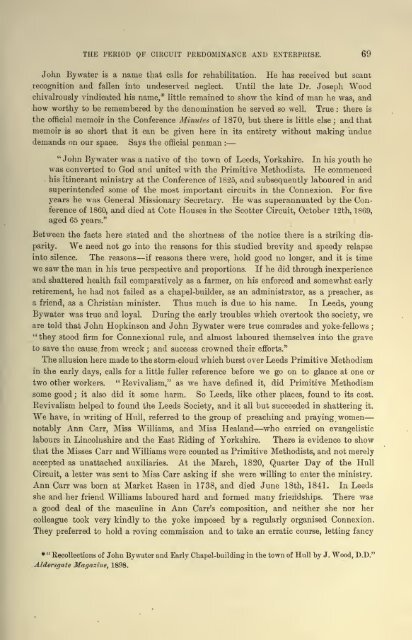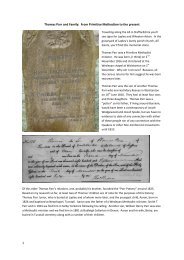Vol 2, pages 1-100 - My Primitive Methodist Ancestors
Vol 2, pages 1-100 - My Primitive Methodist Ancestors
Vol 2, pages 1-100 - My Primitive Methodist Ancestors
Create successful ePaper yourself
Turn your PDF publications into a flip-book with our unique Google optimized e-Paper software.
THE PERIOD OF CIRCUIT PREDOMINANCE AND ENTERPRISE. 69<br />
John By-water is a name that calls for rehabilitation. He has received but scant<br />
recognition and fallen into undeserved neglect. Until the late Dr. Joseph Wood<br />
chivalrously vindicated his name,* little remained to show the kind of man he was, and<br />
how worthy to be remembered by the denomination he served so well. True : there is<br />
the official memoir in the Conference Minutes of 1870, but there is little else ;<br />
and that<br />
memoir is so short that it can be given here in its entirety without making undue<br />
demands on our space. Says the official<br />
penman :<br />
" John Bywater was a native of the town of Leeds, Yorkshire. In his youth he<br />
was converted to God and united with the <strong>Primitive</strong> <strong>Methodist</strong>s. He commenced<br />
his itinerant ministry at the Conference of 1825, and subsequently laboured in and<br />
superintended some of the most important circuits in the Connexion. For five<br />
years he was General Missionary Secretary. He was superannuated by the Conference<br />
of 1860, and died at Cote Houses in the Scotter Circuit, October 12th, 1869,<br />
aged 65 years."<br />
Between the facts here stated and the shortness of the notice there is a striking disparity.<br />
We need not go into the reasons for this studied brevity and speedy relapse<br />
into silence. The reasons if reasons there were, hold good no longer, and it is time<br />
we saw the man in his true perspective and proportions. If he did through inexperience<br />
and shattered health fail comparatively as a farmer, on his enforced and somewhat early<br />
retirement, he had not failed as a chapel-builder, as an administrator, as a preacher, as<br />
a friend, as a Christian minister. Thus much is due to his name. In Leeds, young<br />
Bywater was true and loyal. During the early troubles which overtook the society, we<br />
are told that John Hopkinson and John Bywater were true comrades and yoke-fellows ;<br />
"they stood firm for Connexional rule, and almost laboured themselves into the grave<br />
to save the cause from wreck ;<br />
and success crowned their efforts."<br />
The allusion here made to the storm-cloud which burst over Leeds <strong>Primitive</strong> Methodism<br />
in the early days, calls for a little fuller reference before we go on to glance at one or<br />
two other workers.<br />
" Revivalism," as we have defined it, did <strong>Primitive</strong> Methodism<br />
some good ; it also did it some harm. So Leeds, like other places, found to its cost.<br />
Revivalism helped to found the Leeds Society, and it all but succeeded in shattering<br />
it.<br />
We have, in writing of Hull, referred to the group of preaching and praying women<br />
notably Ann Carr, Miss Williams, and Miss Healand who carried on evangelistic<br />
labours in Lincolnshire and the East Riding of Yorkshire. There is evidence to show<br />
that the Misses Carr and Williams were counted as <strong>Primitive</strong> <strong>Methodist</strong>s, and not merely<br />
accepted as unattached auxiliaries. At the March, 1820, Quarter Day of the Hull<br />
Circuit, a letter was sent to Miss Carr asking if she were willing to enter the ministry.<br />
Ann Carr was born at Market Rasen in 1738, and died June 18th, 1841. In Leeds<br />
she and her friend Williams laboured hard and formed many friendships. There was<br />
a good deal of the masculine in Ann Carr's composition, and neither she nor her<br />
colleague took very kindly to the yoke imposed by a regularly organised Connexion.<br />
They preferred to hold a roving commission and to take an erratic course, letting fancy<br />
* " Becollections of John Bywater and Early Chapel-building in the town of Hull by J. "Wood, D.D."<br />
Aldersgate Magazine, 1898.



